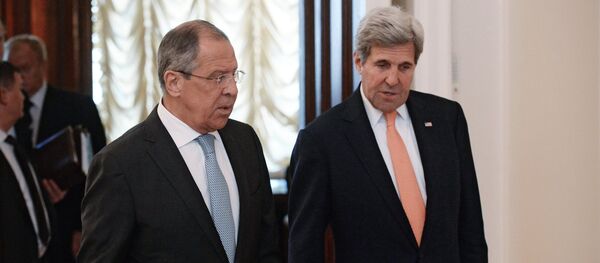According to The Washington Post, the US has proposed to establish the so-called Joint Implementation Group comprising representatives of defense ministries and intelligence. The group would station near Amman, Jordan.
The group would coordinate military operations against al-Nusra Front and increase the efficiency of coordinated actions against Daesh.
Moscow reacted to the initiative without much enthusiasm. According to Kremlin spokesperson Dmitry Peskov, there are still a lot of issues related to cooperation in Syria.
The US continues to support moderate opposition groups in Syria which are expected to topple President Bashar Assad, sooner or later. In order to make this possible, the US needs to convince Russia to stop airstrikes against those groups.
However, Washington’s game in Syria has been complicated after a military coup attempt in Turkey.
The Turkish turmoil may bury US and Russian efforts to settle the Syrian crisis.
"The coup means whatever bets Washington may have made in Moscow are now even harder to implement. We’re not sure who’s in charge there," Andrew Tabler, a Middle East expert at the Washington Institute for Near East Policy, told The Wall Street Journal.
The White House has long been disappointed by Recep Tayyip Erdogan’s policy but Washington still needs Turkey as an ally in the Middle East.
"Turkey is one of three non-Arab countries in the Middle East and a member of NATO that has a decent record of standing up to Russia. It is also increasingly critical for the war against ISIS [Daesh], particularly since Ankara last year agreed to allow US bombers to fly missions into Iraq and Syria from its air base at Incirlik," an article in The Financial Times read.
"Before the putsch, the situation was like this: there is 'good' Syrian opposition backed by a US-led coalition, and there are terrorists this coalition is fighting. In addition, there is Russia who considers both groups terrorists and supports the Syrian government. The landscape is now more complicated," Sergei Ermakov, senior analyst at the Russian Institute for Strategic Research, said.
The attempted coup in Turkey has intensified differences within the coalition and between different opposition groups in Syria, he added.
After the coup was foiled some Turkish officials accused the US of being involved in the organization of the putsch. These accusations give Erdogan the possibility to bargain with Washington, Ermakov said.
Now, Erdogan can bargain with the US over each of the three points and Washington is likely to make some concessions to Ankara, the analyst noted.
"After the putsch, Turkey has to temporarily leave the Syrian game. The coup showed that there are serious contradictions within Turkish society," Ivan Konovalov, head of the Center of Strategic Environment, said.





